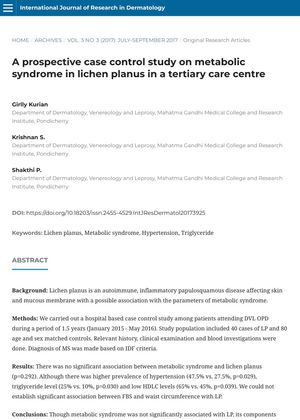A Prospective Case Control Study on Metabolic Syndrome in Lichen Planus in a Tertiary Care Centre
August 2017
in “
International Journal of Research in Dermatology
”

TLDR Lichen planus is not linked to metabolic syndrome, but it is associated with higher rates of high blood pressure, high triglycerides, and low HDL cholesterol.
In a hospital-based case control study conducted from January 2015 to May 2016, researchers examined the potential association between metabolic syndrome and lichen planus, an autoimmune, inflammatory disease affecting the skin and mucous membrane. The study involved 40 cases of lichen planus and 80 age and sex matched controls. The results showed no significant association between metabolic syndrome and lichen planus (p=0.292). However, there was a higher prevalence of hypertension (47.5% vs. 27.5%, p=0.029), elevated triglyceride levels (25% vs. 10%, p=0.030), and low HDLC levels (65% vs. 45%, p=0.039) in patients with lichen planus. No significant association was found between fasting blood sugar and waist circumference with lichen planus. The study concluded that while metabolic syndrome was not significantly associated with lichen planus, its components such as hypertension, elevated triglycerides, and low HDLC levels were significantly associated with the disease. Therefore, patients with lichen planus should be screened for these parameters to prevent potential complications.





